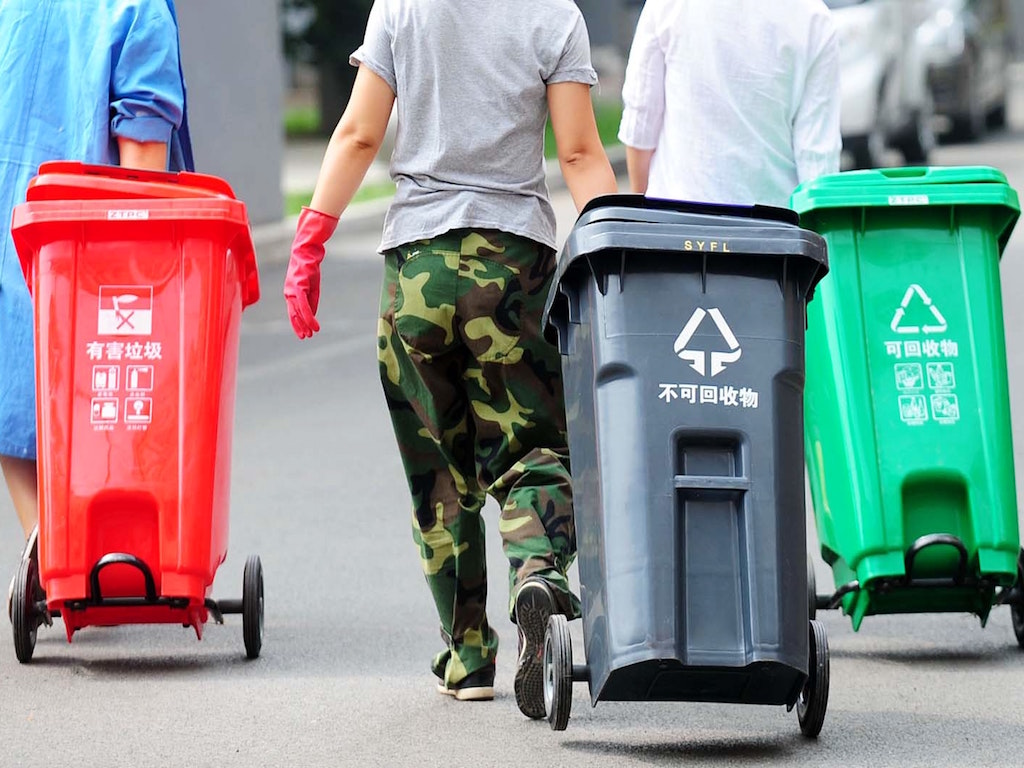3 Mins Read
Chinese e-commerce giants are gearing up to offer tech-forward solutions to help consumers correctly sort waste for recycling, artificial intelligence (AI) powered trash-sorting app functions to virtual personal assistants. These innovations come as Shanghai becomes the first city in mainland China to enforce new waste management policies in July last year, leaving many citizens confused over the correct classification of different types of waste. While they are positively alleviating China’s massive waste problem, these trendy digital solutions developed by online retail giants seems to only scratch the surface of the root issue of our consumption and convenience culture.
In July last year, Shanghai became the first out of the 46 cities to implement new rubbish sorting regulations as a part of the country’s wider efforts to curb its monumental waste crisis. Under these new laws, Shanghai’s 26 million residents will face fines of up to US$ 29 and companies can be slapped with a US$ 7,000 penalty if they fail to correctly sort their waste into four categories: household food waste, residual waste, recyclable waste and hazardous waste.
Chinese corporate giants were quick to capitalise on this opportunity, launching tech-forward solutions to guide Shanghai citizens over how to classify waste and recyclable materials. In August, e-commerce behemoth JD.com launched a new AI-driven solution called “SnapShop” under their JD Finance app, where the application’s more than 300 million users can take a photo of their waste for the app to analyse and tell them where to dispose of it. Even JD.com’s Alexa-like voice-activated smart speaker is now equipped with the function to advise users on how to discard their waste after it has been verbally described.
JD.com is not alone, with multiple other big names launching similar products. Tencent, for instance, who are the operators of the popular WeChat messaging app, have ushered in a “Master of Trash Sorting” keyword-based programme. Available for users in Beijing, Shanghai, Shenzhen and Guangzhou, Tencent’s solution instructs confused waste sorters on how to classify waste based on keywords. Alibaba’s Alipay has also used AI to create a function allowing users to scan items on their phone cameras to assist people on the appropriate category for the particular piece of rubbish. According to Alipay, the function has helped more than 3 million users. Hundreds of other waste and recycling related apps have also appeared on WeChat, Alipay and Apple’s app store, much of it thanks to JD.com open sourcing their waste scanning AI technology under their repository NeuHub.
While they are positively alleviating China’s massive waste problem, the fact that waste and recycling sorting solutions are being developed by online retail giants appears to be a bandaid on a deeper issue: the consumption and convenience culture that pervades China and much of the world. As waste continues to inundate Asia and the world, and our climate crisis continues to escalate, e-commerce companies are smashing records on sales with consumers purchasing more than ever before. China’s annual shopping extravaganza Single’s Day on November 11th, which was originally masterminded by Alibaba in 2009, saw the world’s biggest online sales fest yet this year, drawing in a record-smashing total of US$ 38 billion in sales within a 24 hour window. To put that into perspective, that tops the US$ 29 billion drawn in by Black Friday and Cyber Monday combined.
From the slew of mostly useless items we already have, to the excessive packaging and emissions from transporting deliveries, the massive success of online retail comes with some serious planetary baggage. We are in the midst of a global ecological crisis, from the highest temperatures the world has ever recorded to overflowing landfills. Our mindless overconsumption culture sits at the crux of driving it. Despite the fact that some consumer habits are shifting, we are seeing waste management policies being implemented and businesses are offering more sustainability-related solutions, the reality is that the majority of us are still contributing to the prevailing status quo of obsessively buying more.
Yes, AI-forward solutions for waste management helps, but we have to address the deeper underlying problem. Without embracing a lifestyle that truly focuses on reducing, our planet simply can no longer sustain us.
Lead image courtesy of China Admissions.




